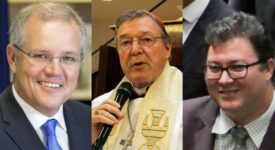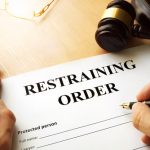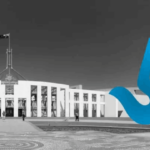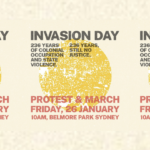The Rising Christian Right: “Dual Citizens of Australia and the Kingdom of God”

“Author Roy Williams has written that, as a Christian, he is sick of the Christian influence in Australia being referred to as either minimal or malign,” says podcaster Karl Faase in a clip spruiking the Church and State Summit 2021, which took place in Brisbane over the 26 February weekend.
But not to worry, if the summit presenters have their way, Williams will only see this influence expand. Indeed, the Church and State advertisement then cuts to Cardinal George Pell, who insists that Christianity involves a “system of values” that “contributes to human flourishing better than any other” such doctrine.
The advert goes on to feature a number presenters raising conference issues, which included Christian duties and beliefs being made illegal, the question as to how a Christian should think about critical race theory and the fact that a lot of “post-abortive women and men regret their abortions”.
While many Australians would simply dismiss this as antiquated rhetoric, the Christian Right – or the religious right, as they’re often referred to – are gaining in prominence. Just take a look at the current Pentecostal PM, who, in 2008, declared “Australia is not a secular country”.
And although it’s been shelved since COVID-19 kicked in, Scott Morrison has been championing the religious freedoms debate, which has been framed as an attempt to protect those of faith from discrimination, whilst, in actuality, seeks to hand them a blank cheque to attack the marginalised.
Blurring extremist lines
Established by blogger David Pellowe in 2018, the annual Church and State conference aims to inform Christians about the “Biblical basis for political involvement” and has a vision of seeing 1,000 Christians in each electorate proactively moving to “influence culture”.
This year’s speakers included George Pell, the Australian Christian Lobby’s Martyn Iles and Nationals Senator Matt Canavan, whilst Liberal National MP George Christensen was also in attendance. In the past, the summit has featured journalist Miranda Divine and Liberal Senator Amanda Stoker.
The summit videos are unreleased. But newborn photographer Angela Forker was set to feature her After the Abortion series that, in her words, reveals the “deep remorse and guilt and the suffering” felt by those who’ve gone through an abortion, “as well as the healing that they found in Jesus”.
Pellowe has been caught in the past taking a selfie with members of white nationalist group the Proud Boys. And he’s the editor of The Good Sauce website, which, on a perusal of its articles, looks like it would appeal to the National Socialist Network and former Senator Fraser Anning.
In one article, Pellowe takes aim at the campaign to stop Aboriginal deaths in custody, as he justifies why the numbers are so high. And as he labels the Black Lives Matter movement racist, it becomes apparent that “love thy neighbour as thyself” doesn’t appear to be on the Christian Right’s agenda.
The right to discriminate
Our nation’s current PM Scott Morrison has made no secret of his Pentecostal faith. In his 2008 maiden speech in parliament, he said his faith was “not a political agenda”.
Morrison then lamented the challenge posed by the now “fashionable” practice of stereotyping those who raise their Christianity in public life as “extreme”, along with the idea that “faith has no place in the political debate of this country”.
“Australia is not a secular country—it is a free country,” then opposition MP Morrison maintained. “This is a nation where you have the freedom to follow any belief system you choose. Secularism is just one. It has no greater claim than any other on our society.”
Nine years later, as parliament was about to vote on same-sex marriage, Morrison left the chamber to abstain. And a fortnight later, the then treasurer appeared in the Herald vowing to defend Christianity by enshrining more religious freedom protections into our nation’s laws.
The outcome of this campaign was the Religious Discrimination Bill, with its original exposure draft being released in August 2019. As it was provoked by marriage equality, the fear was this legislation would target LGBTIQ communities, however the finished product targets all minorities.
On the backburner now, the religious freedoms bill provides those of faith with the means to discriminate against anyone on the basis of sex, sexuality, gender, race or disability if they can justify their discriminating behaviour in the name of their religion, or more specifically Christianity.
Infiltrating government
The Herald’s Michael Koziol reported in a recent article that in addressing the crowd at this year’s Church and State Summit, George Christensen asserted that getting more Christians into the Coalition would sway policy, and he suggested being covert about one’s faith prior to being elected.
Far-right extremists were caught out implementing a similar strategy in 2018, as they attempted to infiltrate the ranks of the NSW Young Nationals.
Incidentally, Christensen spoke at a 2015 Reclaim Australia protest rally, where he told those gathered that our nation is at “war with radical Islam”.
Koziol further notes that Martyn Iles told the conference that targeting transgender people is a key way to countering the LGBTIQ rights movement. The ACL director also claimed that within a few years there will be enough of a Christian presence in parliament to send a “shockwave” through it.
Attacking transgender people has formed a crucial part of Morrison and Co’s religious freedoms crusade. And over the last year, One Nation’s Mark Latham has instigated an attack against transgender kids in NSW on behalf of the Christian Right, despite being a professed atheist.
Fascist undertones
US journalist Chris Hedges has been warning of the rising Christian Right in his country since the publication of his 2007 book American Fascists, in which he warns of a growing number of white Christians disaffected by Washington’s neoliberal agenda mobilising under far-right sentiment.
Former US president Donald Trump came to prominence riding on the back of the Christian Right movement. And these forces – which harbour white nationalist, homophobic and misogynist sentiment – played a prominent role in the January storming of the US Capitol.
The Australian Christian Right isn’t as pronounced as its US counterpart. Although, it’s certainly got advocates in the federal executive, and the growing numbers feeling discontented within the community might find refuge within the movement’s burgeoning ranks.
What the local right-wing Christians do share with those in the States is an affinity with white nationalists. And this might explain why the Coalition has been so reluctant to condemn the increasing grassroots far-right movement simmering in Australian suburbia.







